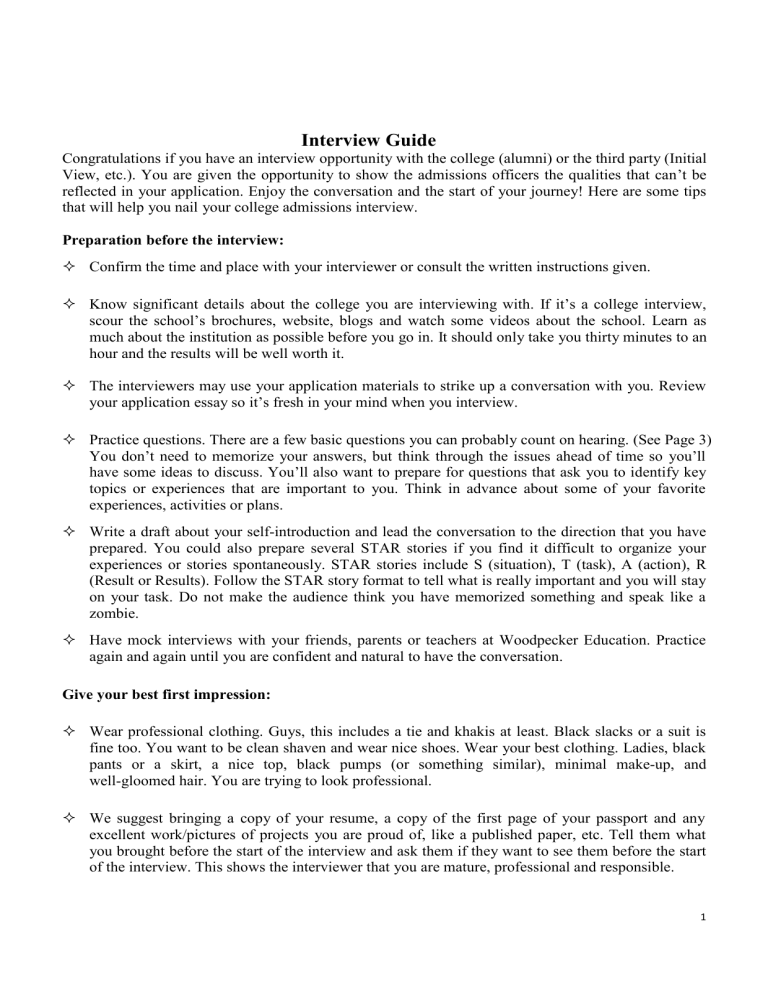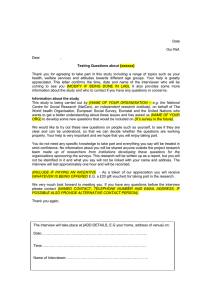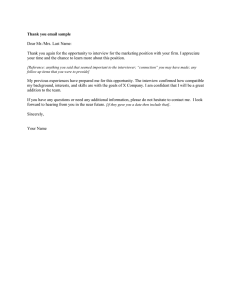
Interview Guide Congratulations if you have an interview opportunity with the college (alumni) or the third party (Initial View, etc.). You are given the opportunity to show the admissions officers the qualities that can’t be reflected in your application. Enjoy the conversation and the start of your journey! Here are some tips that will help you nail your college admissions interview. Preparation before the interview: Confirm the time and place with your interviewer or consult the written instructions given. Know significant details about the college you are interviewing with. If it’s a college interview, scour the school’s brochures, website, blogs and watch some videos about the school. Learn as much about the institution as possible before you go in. It should only take you thirty minutes to an hour and the results will be well worth it. The interviewers may use your application materials to strike up a conversation with you. Review your application essay so it’s fresh in your mind when you interview. Practice questions. There are a few basic questions you can probably count on hearing. (See Page 3) You don’t need to memorize your answers, but think through the issues ahead of time so you’ll have some ideas to discuss. You’ll also want to prepare for questions that ask you to identify key topics or experiences that are important to you. Think in advance about some of your favorite experiences, activities or plans. Write a draft about your self-introduction and lead the conversation to the direction that you have prepared. You could also prepare several STAR stories if you find it difficult to organize your experiences or stories spontaneously. STAR stories include S (situation), T (task), A (action), R (Result or Results). Follow the STAR story format to tell what is really important and you will stay on your task. Do not make the audience think you have memorized something and speak like a zombie. Have mock interviews with your friends, parents or teachers at Woodpecker Education. Practice again and again until you are confident and natural to have the conversation. Give your best first impression: Wear professional clothing. Guys, this includes a tie and khakis at least. Black slacks or a suit is fine too. You want to be clean shaven and wear nice shoes. Wear your best clothing. Ladies, black pants or a skirt, a nice top, black pumps (or something similar), minimal make-up, and well-gloomed hair. You are trying to look professional. We suggest bringing a copy of your resume, a copy of the first page of your passport and any excellent work/pictures of projects you are proud of, like a published paper, etc. Tell them what you brought before the start of the interview and ask them if they want to see them before the start of the interview. This shows the interviewer that you are mature, professional and responsible. 1 Arrive ten to fifteen minutes early. Have a few minutes by yourself to be quiet down and think about what you want to say. A firm handshake and smile would be appropriate. Smile when you meet the interviewer. During the interview: Eye contact. You must practice eye contact during an interview. You want to be able to look at those interviewing you most of the time, but you can look up, down or around as you speak. With a one-on-one interview act like you are having a conversation with a friend and look them in the eye. When interviewing in the initial interview look at the interviewer as she or he asks you the questions but also look at the video camera every now and then when giving your answers. Think about the question. It is common that the interviewer comes up with some questions that you have not prepared for. You can think about it for a few seconds. Three or four seconds may seem like an eternity in your mind but do not panic. A few seconds to the interviewer is not going to look awkward. Just think for a few seconds, organize your thoughts, and then answer appropriately. Add real excitement and emotion to your stories. Do not force emotion, but avoid sounding like your most boring teacher at school. Additionally, you want to use your hands when you talk. Not too much, but use your hands for emphasis. Also, remember to smile from time to time. Do not ramble or answer any question with a list. Example, if they ask “What activities you are involved in?” A list may seem an appropriate way to answer and in a way it is. Be short and concise. Do not go too long or the interviewer will lose patience. Answer the question. Know in mind what question you are answering. Do not give too much irrelevant information. When asked about an activity, do not just repeat the content on the resume but include your own, emotions, feelings and thoughts. For example, if you did some volunteer work, why do you want to help this group of people? Say something like that you are compassionate about the people in need. Read your audience. They best way to do this is to practice and have confidence. Read your audience’s reaction and adjust. Also, connecting a previous comment or experience the interviewer has shared is an excellent way to impress interviewers. For example, if your interviewer introduced himself and says he was a history major, you could ask what he liked most about being a history major at the end of the interview. There is almost always time at the end for you to ask questions. Try to avoid questions that you could easily look up online. Instead ask an insightful question about the college. A good question might be, “I’m interested in doing research as an undergraduate. Who would I talk to on campus about looking into those opportunities further?” Be considerate and thankful to anyone who interviews you. Say thank you at the end of the interview or send a thank-you note. If you found something helpful or you had a shared experience, mention it briefly. Most of all make sure to express your interest in the school and your gratitude for the time the interviewer took to meet with you. 2 Common Questions: • Tell me about yourself. • Tell us about your hometown and family. • Why do you want to study abroad? / What makes you want to go to college in America? • What do you think will be some of the biggest differences from a Chinese education system and an American college experience? • What is your career goal? What are your long-range goals? • Where do you see yourself in ten years from now? • Why are you interested in attending our program? • What are your extracurricular activities/hobbies? • What do you like to do in your free time? • What extracurricular activities do you wish to join at your university? • Why should we accept you over other qualified applicants? • Upon completion of your degree, what do you plan to do? • What are some of the reasons that you have chosen this major/profession? • Why do you think you will be successful in this major/profession? • Tell me about your experiences in your field of interest. • What are some of the rewards and some of the frustrations? • What was your most rewarding high school/college experience? • Who/What has influenced you the most over your lifetime? • How would your friends describe you? • What industry trends have you seen in recent years in China and around the world? • What will you contribute to our school? / How can you contribute to our community? • What is one of the most challenging experiences that you have overcome? • Do you have any questions to ask me? • Tell me about a time you were a leader or displayed leadership? • What are your strengths and weaknesses? • Does your high school record accurately describe who you are? • Are there any obstacles you foresee in coming to America? How will you handle leaving your family and friends? • How would do define success? • Do you think you are a good student? • What are the qualities that you think make for a great student? • Have you been to America before? • What books/movies have you read/seen recently?


